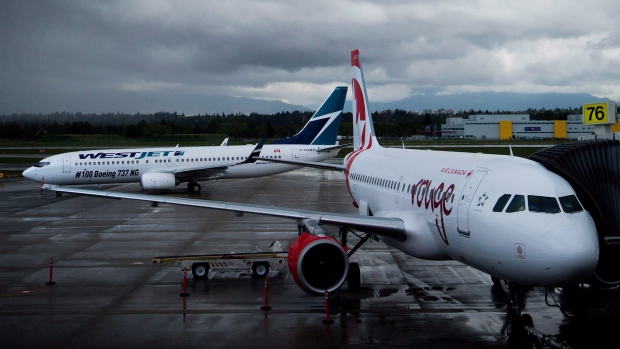Mar 15, 2019
How bad will Boeing's 737 Max groundings hit Canada's airlines?
, BNN Bloomberg

Canada’s major airlines are going to have to search for alternatives as Boeing Co.’s 737 MAX series jets sit idle in their hangars.
Both Air Canada and WestJet Airlines Ltd. will take a capacity hit after Transport Canada joined the global push to keep the 737 MAX jets out of the skies after the plane was involved in two deadly crashes in five months. Air Canada operates 24 of the 737 MAX series jets, while WestJet has 13 within its fleet.
To comply with the order, Air Canada said it would attempt to rebook passengers from the 737 MAX jets, which carry between 9,000 and 12,000 passengers a day. WestJet announced 18 MAX-related cancellations on Friday, affecting 1,800 customers.
Don Lato, president of Padlock Investment Management, told BNN Bloomberg in a Wednesday interview that both airlines can expect to take a significant hit in the short-term.
“There’s no way that it’s not going to cost either of them money. You just simply don’t have extra planes hanging around,” Lato said.
“I’m not sure how they’re going to address the issue. That’s going to be a big problem for them and, if this thing drags on for weeks or months, it’s going to be an even bigger drag on them.”
Boeing’s 737 MAX fleet was grounded in many of the world’s largest countries, including Canada, the U.S. China, India and all of Europe following the crash of Ethiopian Airlines Flight 302 on March 10.
All 157 people aboard the MAX 8 plane were killed just six minutes after takeoff from Addis Ababa Bole International Airport. The crash marked the second for Boeing’s 737 MAX fleet in less than six months, after Lion Air Flight 610 went down after 12 minutes in the air, killing all 189 aboard on Oct. 29, 2018.
Toronto-Dominion Bank wrote in a research note on Thursday it believes the safety concerns levelled at the MAX series jets would have, at the very least, a slightly negative long-term impact on Canada’s airlines.
“We believe that the temporary reduction in revenue and increase in costs that could result from the grounding may be partially offset by higher fares as a result of the lower capacity in the market,” TD analysts Tim James and Shawn Levine wrote. “We believe that some traveler concerns regarding flying the the 737 MAX during and even after the groundings are lifted, could lead to additional challenges for the airlines.”
Air Canada suspended its 2019 financial forecasts on Friday, citing the “current uncertainty” caused by the 737 MAX suspension.
Macquarie Capital Markets said the grounded 737 MAX jets would result in limited harm to the Canadian operators. In a note to clients on Thursday, Macquarie analysts Konark Gupta and Daniela Campo said that the MAX fleet could be back in the air as early as May following a software update scheduled for April.
The analysts noted that timing is on the airlines’ side -- for the time being.
- Boeing’s lawsuit risks soar around second 737 Max disaster
- Anxious passengers can't get through to Air Canada as Max 8 ban snarls service
737 MAX JETS GROUNDED
“The financial impact should be manageable and limited to near-term,” the report stated. “We also note business seasonality is relatively low in the next couple of months.”
Shares of both companies took a hit this week, with Air Canada (AC.TO) down five per cent from Monday’s close, ending the week at $31.66. WestJet shares (WJA.TO) dipped 4.5 per cent over the same period, closing the week at $19.64.
TD said the grounded 737 MAX fleet may result in higher fares while MacQuarie noted that short-term leasing of additional aircraft may be a necessary stop-gap measure.
However, TD stated idled planes is “very unlikely” to “materially change either airlines’ financial condition, or 2020 (and beyond) earnings and cash flow power.”
Both analyst reports said Air Canada and WestJet are likely to look to offset their losses with compensation from Boeing, the plane’s manufacturer.
Those charges– which would also likely come from other global carriers impacted by grounding their 737 MAX plans – could be significant to Boeing, according to one litigation lawyer.
“Here, where we have 350 aircraft going out of service all at the same time, it’s going to be a lot more difficult,” Jason Wadden, partner at Goodmans, told BNN Bloomberg in an interview on Thursday. He compared the current suspension to the three-month grounding of 50 Boeing Dreamliners in 2013.
“That’s why there’s likely to be an increased risk of additional losses that Boeing is going to be looked to to compensate the airlines for.”
Wadden added that US$1 billion to US$5 billion would be a “reasonable estimate” for the financial hit Boeing could expect to take, considering the number of fatalities in the crashes and the lost revenues airlines that operate the 737 MAX jets are expected to report.
Lato said that the impact on Canada’s carriers can’t be limited to only a domestic scope.
“We’re a small population, compared to the rest of the world, but there’s a lot of air space, and the grounding includes any planes flying in Canada’s air space,” he said.
“A lot of Trans-Pacific or Trans-Atlantic flights would generally go over the North Pole and down into the U.S. It’s not an insignificant impact, what this grounding is doing.”





